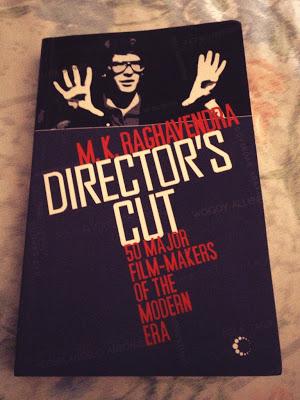 There are
film directors that I have known of for years mainly because of the blockbuster
films that are part of their filmography. Then, there are directors that I have
heard of in the passing, but whose films I have never explored. There also
exist films that I know of, or have seen, but possibly cannot recall who
directed them. Lastly, there are directors whose names or filmographies are
completely alien to me. Director’s Cut covers each of the above scenarios
making for a brilliant, informative, and entertaining read.
There are
film directors that I have known of for years mainly because of the blockbuster
films that are part of their filmography. Then, there are directors that I have
heard of in the passing, but whose films I have never explored. There also
exist films that I know of, or have seen, but possibly cannot recall who
directed them. Lastly, there are directors whose names or filmographies are
completely alien to me. Director’s Cut covers each of the above scenarios
making for a brilliant, informative, and entertaining read.
World Cinema is an acquired taste. For me, it has long been a way to judge the love a person has towards films, for any true cinephile would be somewhat knowledgeable about films being made outside of their own country. Director’s Cut by M. K. Raghavendra is a crash course in World Cinema. His introduction wherein he explains his criteria for selecting the directors seems a bit academic, but his essays on the 50 directors from around the world are anything but that. Raghavendra covers directors whose body of work has been prominent from 1960 onwards. That’s his cut off year. What we get as a result is a combination of film-makers that have been responsible for bringing a revolution, in their own unique fashion, in the art of film making over the last half a century.
Director’s Cut is an easy read. Because each of the 50 directors get their equal share of space in the book, it’s easy to jump around from one director to another and as a result from one country to another and explore cinema’s prominence in developing the ethos of the society around the world. Raghavendra doesn’t let the reader get bored. He informs, but he also leaves enough space for the reader to go out and explore the directors he writes about. His essays, which comprise of a small biography, followed by discussions about the director’s premier works, last around six to seven pages each, thus taking the reader on a whirlwind tour of cinema across decades, genres, and physical boundaries. Raghavendra carefully looks at the movies and the characters that have defined these directors and then discusses the effects each one has had over the years, especially focusing on how the director has progressed from one body of work to another, never shying away from stating his true opinion about the films.
The book, in my eyes, only falters on one occasion. In the process of discussing the works of the directors, at times Raghavendra has to divulge in the ending or discuss some of the key moments. While he tries his best to not spoil the film, it’s not an easy task when making a point about the thought process of the director. Herein lies a dilemma for the reader. It’s not hard to skip certain paragraphs and come back to them later, once you have watched the film, but it does break the flow. Nevertheless, since Raghavendra doesn’t talk about each and every film of the director, it’s also not a problem that should stop you from experiencing the vastness of the information that is provided in the book. Director’s Cut shines because Raghavendra, who seems to possess a door leading straight into the psyche of a modern cine-buff, picks directors like Satyajit Ray, Akira Kurosawa, and Francois Truffaut who would satisfy the purists, but then goes on to pick Steven Spielberg, Martin Scorsese, and Woody Allen, directors that would interest your everyday moviegoer who is content with popular or blockbuster cinema. But, Raghavendra doesn’t just stop there, he goes a step further and picks up on Wong Kar-Wai, Bong Joon-Ho, Raj Kapoor, and Zhang Yimou to feature Aisan cinema followed by directors such as Abbas Kiarostami, Krzysztof Kieslowski, and Pedro Almodovar that without a doubt are responsible for the ever disappearing boundaries that have separated cinema all these years. In fact, so in tune is Raghavendra with today’s cinema going public, that he doesn’t forget Quentin Tarantino and Takeshi Kitano whose “pulp cinema” has been both controversial and entertaining.
50 directors, 50 essays on those very souls who have made modern cinema a marvel; Director’s Cut is a wonderful addition to any film fan’s library; a necessity for anyone who has even remote interest in cinema; but essential for the one who is yet to discover the magic that is World Cinema.
Note: A special thanks to Harper Collins India who sent the book for review.

